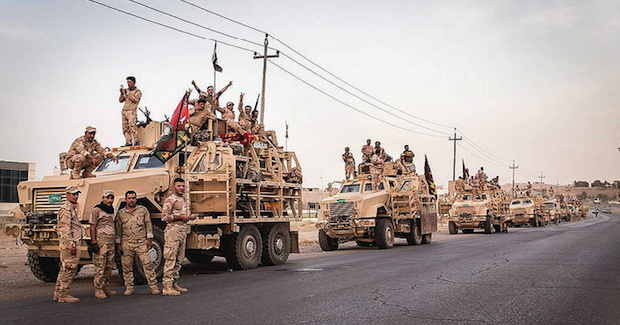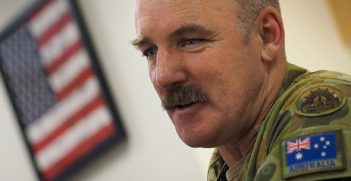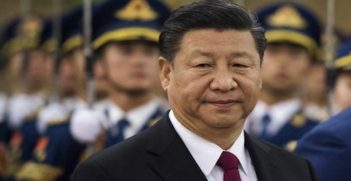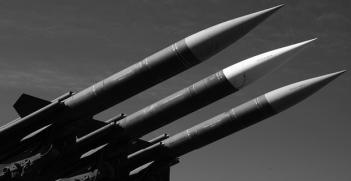The Politics of Post-Mosul Iraq

There is concern about the direction of the battle to retake Mosul after reports this week from Human Rights Watch that Kurdish Peshmerga fighters have committed war crimes against Sunni Arabs in earlier conflicts. The Peshmerga are one of a multitude of armed groups taking part in the Iraqi government-led offensive to liberate the city of Mosul from the Islamic State terrorist group. This is a broad but temporary alliance between local and regional forces that share a common enemy but have competing political objectives and underlying interests.
The Iraqi government has brought overwhelming force to this military action and is expected to take control of Mosul, yet it acknowledges that the fight will continue for some time after the city’s liberation. The situation presents short-term humanitarian and security risks and longer-term political challenges that the international community is already preparing for.
Short-term risk
The Iraqi security forces are leading the fight at Mosul, supported by the Kurdish forces and the international coalition, and have taken measures to prevent the involvement of predominantly Shi’a armed groups of the Popular Mobilisation Units (PMU) from inflaming tensions. The PMU are non-state forces ostensibly established for the purpose of assisting in the war against the Islamic State group. As several observers have rightly reminded us, alliances are seldom permanent; there are tense relationships and even rivalries between many of the local and regional actors that have converged on the battlefield. There is a significant risk that the war against the Islamic State group will be closely followed by a series of wars between other Iraqi groups.
Civil society groups in Iraq, international non-government organisations, and political and security analysts have warned that there is also a danger of further humanitarian catastrophe. Since 2014, minorities in northern Iraq have suffered war, genocidal violence and displacement. Women and girls have suffered immensely. Specifically, the Mosul offensive has displaced 34,000 people and this figure may grow to one million. The wider humanitarian response in Iraq is underfunded and resources are already stretched. There are concerns that people displaced by the Mosul offensive will not receive adequate protection and that armed groups may engage with impunity in retaliatory violence against communities perceived to have supported the Islamic State group.
Armed groups, from the Kurds to the PMU, are acutely conscious of their public image and the role of media, including social media, in modern warfare. Carefully managed information campaigns demonstrate a sensitivity to public and international perceptions of their battlefield conduct, their treatment of civilians and their ability to keep ethnic or religious prejudices in check. Anyone who has witnessed—even from afar—the violence that Iraqis have experienced since 2003 will be forgiven for staking a cautiously optimistic view on the images of soldiers and fighters displaying respect for other religions and compassion for victims of war. To date, predicted revenge killings have thankfully not occurred, despite atrocities committed by the Islamic State group, which has used such acts in the past to provoke further violence.
Yet there are warning signs that cannot be ignored. Several armed groups have records of abusive behaviour against civilians. Some have used symbol-rich language that is either designed to inflame or can be interpreted as such. Others are influenced by national or external actors (or both) and may use violence in pursuit of political or strategic interests.
Positioning for a new political configuration
The human costs of this war will be felt for a long time. Other longer-term impacts are related to the political ambitions of the various armed groups that have mobilised, willingly or otherwise, to fight the Islamic State group. Many now seek a role in Iraqi (and therefore regional) politics. The Iraqi government wishes the PMU to demobilise following the defeat of the Islamic State group and integrate into the national security forces. However, several PMU leaders have signalled their intention to maintain a permanent role in politics. One leader declared his intention that the PMU become a “third power” in Iraqi politics, independent of the armed forces and modelled on the Iranian Revolutionary Corps Guard. It is also likely that, should they achieve electoral success in future, these groups will use influence over state institutions to develop patronage networks, just as the established political parties have done.
This development, should it eventuate, will disrupt Iraq’s already turbulent national politics, and established political figures are preparing to engage with this potential new configuration of power. For instance, a group of leaders from armed groups recently assembled at the home of Muqtada al-Sadr, a politically influential and controversial cleric. The aims of the meeting were to settle past differences, discuss the rules of engagement at Mosul, and agree in principle to an electoral alliance for upcoming elections. Not only does al-Sadr head an armed group and oversee a parliamentary bloc, he leads a broad social and religious movement that, in collaboration with allies in Iraq’s evolving civil society, is engaged in an active and at times spectacular campaign of street politics aimed at political reform. He and his (current) allies—some of whom he broke contact with in years past—are positioning themselves for a reshaped national political landscape populated by new interests and (armed) groups.
It seems international actors are likewise preparing themselves for this new reality. It is common for ministers, diplomats and other international representatives to meet with Iraqi non-state actors such as local politicians, religious leaders, and figures associated with armed groups. There are hints that similar discussions with emerging figures are now taking place behind closed doors. These meetings are not yet fit for the public eye, although a well-connected journalist at Al-Monitor gained an insider’s account that suggests that many nations, possibly including Australia, are interested in talking to Iraq’s new political actors. Such clandestine discussions demonstrate these groups’ intention to remain on the political scene and their understanding of the benefits that can flow from international legitimacy. They also suggest that international actors have recognised these emerging actors and are willing to engage with them.
Here to stay
The emergence of the Islamic State group raised questions—both in its propaganda and in the minds of distant observers—about the future of the Iraqi state. The government of Iraq, despite the goodwill associated with military successes, remains in a tenuous position. It faces an ongoing humanitarian crisis, flare-ups of popular discontent, regular parliamentary dysfunction, external pressures, and long-term economic and security challenges. It is into this maelstrom that confident and ambitious armed groups are now stepping. Non-state actors—and their armed groups—will be a permanent feature of Iraqi politics for the foreseeable future. Some members of the international community have concluded that early engagement is the best approach to this challenge.
Damian Doyle is a PhD scholar at the Centre for Arab and Islamic Studies at the Australian National University. His research is focused on social movements and contentious politics in Iraq. You can find him on Twitter @toaf
This article is published under a Creative Commons Licence and may be republished with attribution.





